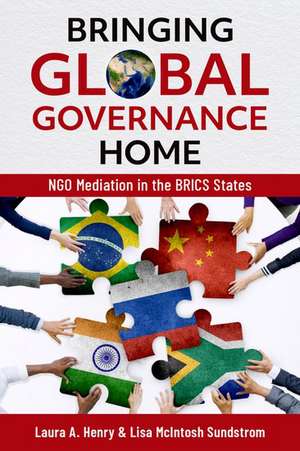Bringing Global Governance Home: NGO Mediation in the BRICS States
Autor Laura A. Henry, Lisa McIntosh Sundstromen Limba Engleză Hardback – 2 feb 2022
Preț: 438.24 lei
Preț vechi: 485.75 lei
-10% Nou
Puncte Express: 657
Preț estimativ în valută:
83.86€ • 87.78$ • 69.80£
83.86€ • 87.78$ • 69.80£
Carte disponibilă
Livrare economică 27 februarie-05 martie
Preluare comenzi: 021 569.72.76
Specificații
ISBN-13: 9780197530238
ISBN-10: 0197530230
Pagini: 304
Dimensiuni: 244 x 165 x 33 mm
Greutate: 0.54 kg
Editura: Oxford University Press
Colecția OUP USA
Locul publicării:New York, United States
ISBN-10: 0197530230
Pagini: 304
Dimensiuni: 244 x 165 x 33 mm
Greutate: 0.54 kg
Editura: Oxford University Press
Colecția OUP USA
Locul publicării:New York, United States
Recenzii
Bringing Global Governance Home offers fascinating insights into the ways that NGOs from the BRICS countries engage in global governance. It should be of great interest to scholars of international relations, international organizations, transnational advocacy, as well as those who study politics of each of the BRICS countries.
In their focus on NGOs as mediators translating between global institutions and national policy and practice, Henry and Sundstrom effectively and compellingly bridge old theoretical divides to bring new insights to crucial questions concerning global governance in the face of rising BRICS power. By addressing how and when NGOs can help implement international rules and norms even in more authoritarian contexts, this book sets a strong foundation for the next generation of NGO scholarship.
Henry and Sundstrom have developed a compelling comparative analysis of how the BRICS countries' different regulatory approaches to the nonprofit sector shape the capacities of NGOs to champion solutions to major global challenges. This book is an essential contribution to our understanding not only of the strategic significance of BRICS countries, but also the future of NGOs as global actors.
The diverse domestic politics of the BRICS offer a wonderful opportunity to explore the role of NGOs in translating global rules into local practice. Henry and Sundstrom masterfully explain how NGOs mediate among local and global audiences while trying to represent the excluded, stay independent from states, and make global guidelines into national rules. This clearly written, wide-ranging book is essential for NGO scholars and those interested in the future of the global liberal order.
Henry and Sundstrom are providing a key link in the chain in understanding the way that global governance works through transnational civil society: the work of domestic NGOs.Their research highlights the challenges faced by NGOs 'going global' by focusing on NGOs based in the BRICS—a loose association of developing states that are agitating to influence global politics in a multitude of issue areas. A must-read for students of global governance, civil society, and emerging powers.
In their focus on NGOs as mediators translating between global institutions and national policy and practice, Henry and Sundstrom effectively and compellingly bridge old theoretical divides to bring new insights to crucial questions concerning global governance in the face of rising BRICS power. By addressing how and when NGOs can help implement international rules and norms even in more authoritarian contexts, this book sets a strong foundation for the next generation of NGO scholarship.
Henry and Sundstrom have developed a compelling comparative analysis of how the BRICS countries' different regulatory approaches to the nonprofit sector shape the capacities of NGOs to champion solutions to major global challenges. This book is an essential contribution to our understanding not only of the strategic significance of BRICS countries, but also the future of NGOs as global actors.
The diverse domestic politics of the BRICS offer a wonderful opportunity to explore the role of NGOs in translating global rules into local practice. Henry and Sundstrom masterfully explain how NGOs mediate among local and global audiences while trying to represent the excluded, stay independent from states, and make global guidelines into national rules. This clearly written, wide-ranging book is essential for NGO scholars and those interested in the future of the global liberal order.
Henry and Sundstrom are providing a key link in the chain in understanding the way that global governance works through transnational civil society: the work of domestic NGOs.Their research highlights the challenges faced by NGOs 'going global' by focusing on NGOs based in the BRICS—a loose association of developing states that are agitating to influence global politics in a multitude of issue areas. A must-read for students of global governance, civil society, and emerging powers.
Notă biografică
Laura A. Henry is a Professor in the Department of Government and Legal Studies at Bowdoin College. Her research investigates Russia's post-Soviet politics, focusing on state society relations, NGOs, and social movements. She is particularly interested in environmental politics and the interaction of transnational and local actors. Henry is the author of Red to Green: Environmental Activism in Post-Soviet Russia and the co-editor of Russian Civil Society: A Critical Assessment. Her work has appeared in Environmental Politics, Global Environmental Politics, Post-Soviet Affairs, and Europe-Asia Studies among other journals. She has been a Watson Foundation fellow and a Fulbright Scholar. Her research has received support from the National Security Education Program, the Social Science Research Council, and the International Research and Exchange Board.Lisa McIntosh Sundstrom is a Professor of Political Science at the University of British Columbia. Her regional area ofexpertise is Russia, and her major research interests include democratization, human rights, women's rights, legal mobilization, and NGO activism in both domestic and transnational politics. She is co-author of Courting Gender Justice: Russia, Turkey, and the European Court of Human Rights, author of Funding Civil Society: Foreign Assistance and NGO Development in Russia, and the co-editor of Russian Civil Society: A Critical Assessment as well as Global Commons, Domestic Decisions: The Comparative Politics of Climate Change. She has published in scholarly journals including International Organization, Global Environmental Politics, Communist and Post-Communist Studies, Europe-Asia Studies, Problems of Post-Communism, and Human Rights Quarterly.
